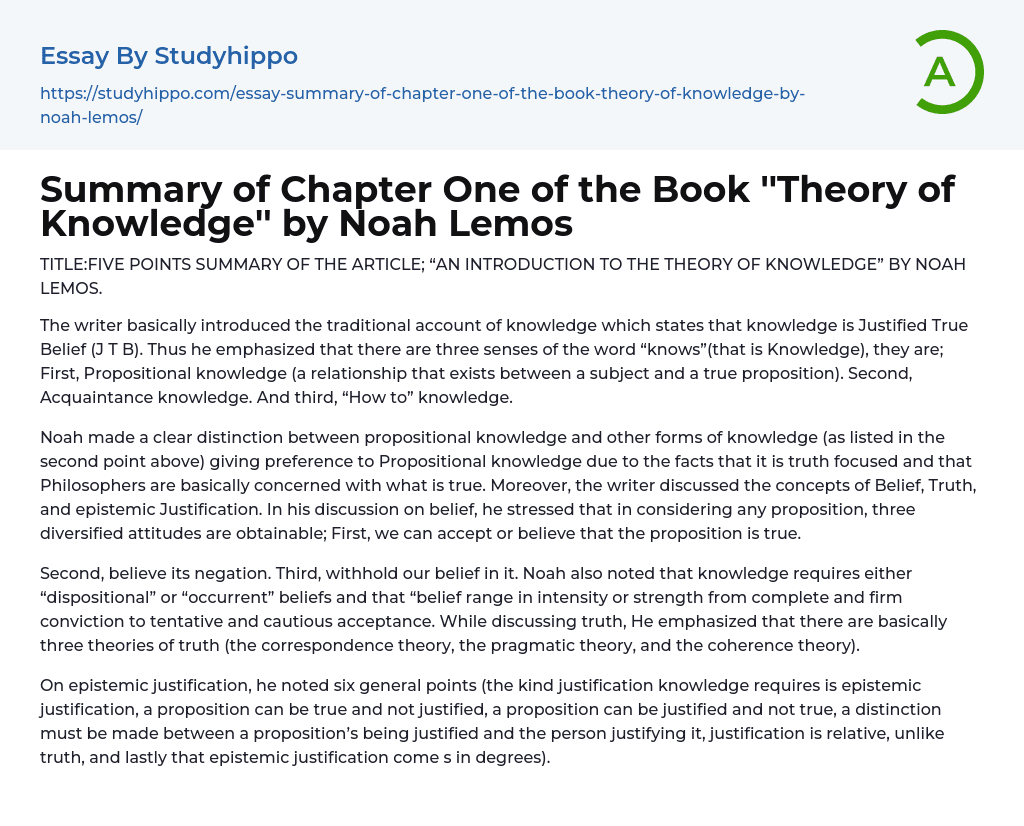

Summary of Chapter One of the Book ”Theory of Knowledge” by Noah Lemos Essay Example
The writer basically introduced the traditional account of knowledge which states that knowledge is Justified True Belief (J T B). Thus he emphasized that there are three senses of the word “knows”(that is Knowledge), they are; First, Propositional knowledge (a relationship that exists between a subject and a true proposition). Second, Acquaintance knowledge. And third, “How to” knowledge.
Noah made a clear distinction between propositional knowledge and other forms of knowledge (as listed in the second point above) giving preference to Propositional knowledge due to the facts that it is truth focused and that Philosophers are basically concerned with what is true. Moreover, the writer discussed the concepts of Belief, Truth, and epistemic Justification. In his discussion on belief, he stressed that in considering any proposition, three diversified attitudes are obtainable; First, we
...can accept or believe that the proposition is true.
Second, believe its negation. Third, withhold our belief in it. Noah also noted that knowledge requires either “dispositional” or “occurrent” beliefs and that “belief range in intensity or strength from complete and firm conviction to tentative and cautious acceptance. While discussing truth, He emphasized that there are basically three theories of truth (the correspondence theory, the pragmatic theory, and the coherence theory).
On epistemic justification, he noted six general points (the kind justification knowledge requires is epistemic justification, a proposition can be true and not justified, a proposition can be justified and not true, a distinction must be made between a proposition’s being justified and the person justifying it, justification is relative, unlike truth, and lastly that epistemic justification come s in degrees)
- Boo Radley essays
- Genesis essays
- Richard iii essays
- Alice in Wonderland essays
- On the road essays
- Ozymandias essays
- The Nightingale essays
- Holden Caulfield essays
- Animal Farm essays
- 1984 essays
- A Hanging essays
- Shooting An Elephant essays
- A Tale Of Two Cities essays
- Adventures Of Huckleberry Finn essays
- Arthur Conan Doyle essays
- Brave New World essays
- Characters In Hamlet essays
- Characters In Romeo And Juliet essays
- Desdemona essays
- Diary Of A Wimpy Kid essays
- First-Person Narrative essays
- Frankenstein essays
- Heart Of Darkness essays
- Jane Eyre essays
- Jay Gatsby essays
- King Duncan essays
- Librarian essays
- Little Red Riding Hood essays
- Lord Of The Flies essays
- Silas Marner essays
- The Cask Of Amontillado essays
- The Catcher In The Rye essays
- The Crucible essays
- The Handmaid's Tale essays
- The Reader essays
- Virgil essays
- Wuthering Heights essays
- Candide essays
- Castle essays
- J. D. Salinger essays
- Ulysses essays
- Ethan Frome essays
- In Cold Blood essays
- Outliers essays
- Tuesdays With Morrie essays
- The Art of War essays
- Wife of Bath essays
- Huckleberry Finn essays
- The Lady With The Dog essays
- Great Expectations essays



